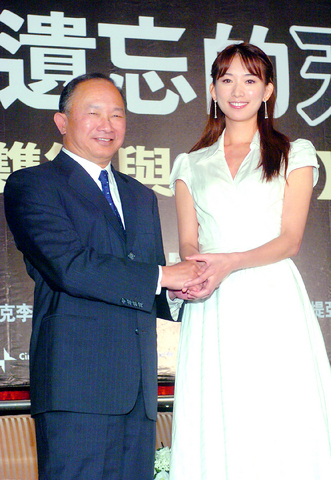The official list of nominees for this year's Golden Melody Awards (金曲獎) was released last Friday, eliciting oohs and aahs as well as disapproval over its non-commercial appeal. Puyuma folk singer Kimbo, or Hu De-fu (胡德夫) in Chinese, is the most surprising dark horse, securing six nominations including Best Male Singer, Best Chinese-Language Album, Best Lyricist and Best Composer.
Also with six nomi-nations, David Tao (陶吉吉) is the only pop singer able to match the powerful presence of Kimbo. Tao and the Aboriginal singer are up against Wang Lee-hom (王力宏) and Jackie Cheung (張學友), among others, for the best male singer gong.
Local rocker Wu Bai (

PHOTO: TAIPEI TIMES
Chen and Tai are also in the Best Female Singer category with Tanya Tsai (
Notably absent from the roll call are the Double J pair Jay Chou (
On a queer note, TV host Kevin Tsai's (蔡康永) partner George Liu (劉坤龍) was spotted visiting a gay sauna last week. Protective of their 12-year relationship, Tsai asked local media not to publish speculations based on the outing: "I trust him. It won't affect our relationship. ... Gay gatherings are always stigmatized as if we go there only for sex."
It's understandable that Tsai, as a public figure, is reluctant to publicize his private life in the mainstream media. But it is common knowledge that gay men don't go to saunas just for a relaxing bath.
In more gay-related news, Lee Joon-gi, the lead actor of South Korean box-office hit King and the Clown came to Taiwan last weekend to meet his mostly high-school-age female fans. Playing a feminine man torn between the love of a king and a masculine clown, the 24-year-old androgynous-looking star's sexual orientation was the subject of considerable speculation. "I love women," Lee repeatedly told local media while demonstrating taekwondo moves in a bid to prove his masculinity (as if it would help) at a press conference last Saturday.
Still, it wouldn't surprise Pop Stop if male audience members begin to question their feelings toward their girlfriends when they see the beautiful star dressed up on the big screen.
International director John Woo (吳宇森) has officially confirmed the rumor that Taiwan's pride and joy, Lin Chi-ling (林志玲), will play the leading lady in his historical drama Battle of the Red Cliff (赤壁之戰).
Also starring in the flick with a NT$1.6-billion budget will be Woo's old pal Chow Yun-fat (
Even though the script has yet to be finished the movie has generated heated discussion and cranked up the rumor mill.
For the sake of her debut movie and becoming something more than a hack actress in the shortest possible time, the supermodel quit all her TV work and started taking acting classes. Her agent said Lin's career will turn away from local television in favor of cinematic "international production." A lucky career break for Lin, since working in international productions with hot Asian directors has repeatedly proven to be a short cut to international stardom.

As we live longer, our risk of cognitive impairment is increasing. How can we delay the onset of symptoms? Do we have to give up every indulgence or can small changes make a difference? We asked neurologists for tips on how to keep our brains healthy for life. TAKE CARE OF YOUR HEALTH “All of the sensible things that apply to bodily health apply to brain health,” says Suzanne O’Sullivan, a consultant in neurology at the National Hospital for Neurology and Neurosurgery in London, and the author of The Age of Diagnosis. “When you’re 20, you can get away with absolute

When the South Vietnamese capital of Saigon fell to the North Vietnamese forces 50 years ago this week, it prompted a mass exodus of some 2 million people — hundreds of thousands fleeing perilously on small boats across open water to escape the communist regime. Many ultimately settled in Southern California’s Orange County in an area now known as “Little Saigon,” not far from Marine Corps Base Camp Pendleton, where the first refugees were airlifted upon reaching the US. The diaspora now also has significant populations in Virginia, Texas and Washington state, as well as in countries including France and Australia.

On April 17, Chinese Nationalist Party (KMT) Chairman Eric Chu (朱立倫) launched a bold campaign to revive and revitalize the KMT base by calling for an impromptu rally at the Taipei prosecutor’s offices to protest recent arrests of KMT recall campaigners over allegations of forgery and fraud involving signatures of dead voters. The protest had no time to apply for permits and was illegal, but that played into the sense of opposition grievance at alleged weaponization of the judiciary by the Democratic Progressive Party (DPP) to “annihilate” the opposition parties. Blamed for faltering recall campaigns and faced with a KMT chair

A police station in the historic sailors’ quarter of the Belgian port of Antwerp is surrounded by sex workers’ neon-lit red-light windows. The station in the Villa Tinto complex is a symbol of the push to make sex work safer in Belgium, which boasts some of Europe’s most liberal laws — although there are still widespread abuses and exploitation. Since December, Belgium’s sex workers can access legal protections and labor rights, such as paid leave, like any other profession. They welcome the changes. “I’m not a victim, I chose to work here and I like what I’m doing,” said Kiana, 32, as she